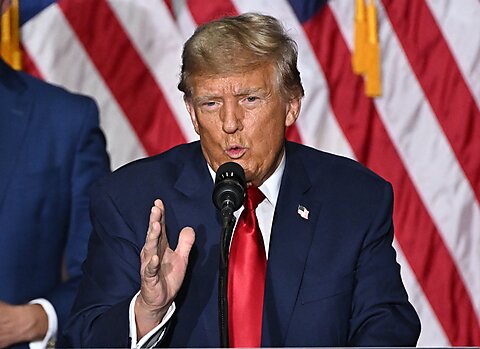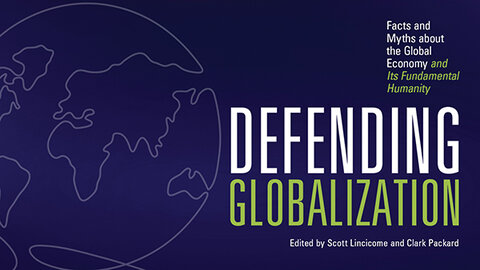
Section 3 of the Fourteenth Amendment bars from “office…under the United States” any person who, having previously taken an oath to support the Constitution, “shall have engaged in insurrection or rebellion against the same, or given aid or comfort to the enemies thereof.” Does this clause bar Donald Trump from the presidency, and if not, is the deficiency factual, legal, or both? Who can make a legally effective determination of disqualification? How much weight should we give concerns that a disqualification restricts democratic choice? Is it proper for the Supreme Court in reviewing the question to take into account likely public reactions or risks of political unrest, and assuming it is, what reactions or risks should we anticipate?
We at Cato join in supporting certain values such as reason, individual liberty, and limited government, but are not expected to all reach the same conclusions when it comes to questions of application, especially when the questions as here are novel, complex, and dependent on historical scholarship. In that spirit, here is a listing in reverse chronological order of some writings by Cato scholars taking a variety of views on Section 3 questions.
Jeffrey Miron, Feb. 13, 2024. “If Section 3 keeps a popular candidate off the ballot, that will likely increase polarization and resentment amongst the candidate’s supporters, perhaps to the point of further, and worse, insurrection.”
Thomas A. Berry, “Trump’s Disqualification Case Could Set a Dangerous First Amendment Precedent,” National Review, Feb. 8. “There are multiple ways that the Court could find Trump to be disqualified for insurrection without holding his speech [at the Ellipse on January 6] to be categorically unprotected. Affirming the Colorado supreme court’s methods would unnecessarily set a dangerous precedent that could chill the speech of politicians and activists of all political persuasions.”
James Craven and Patrick G. Eddington, “Ballot Disqualification: The Stakes,” Feb. 7. “Section 3 of the Fourteenth Amendment is a powerful guardrail for democracy that was won at a high cost to our country. The court should enforce this powerful provision to disqualify Trump, and in doing so, protect both the nation and the rule of law.”
Anastasia P. Boden, “Section 3 and the Fallacy of Democratic Primacy,” Jan. 28, 2024. “Disqualifying Trump under Section 3 might be a bad idea for many reasons; it also might be wrong as a constitutional matter. But it’s neither bad nor wrong merely because of some supposed antidemocratic effect. This is one of the weakest arguments against disqualification, and yet it’s one of the most prevalent.”
Robert A. Levy, “Trump’s Disqualification: A Primer,” Dec. 28, 2023. “My bet is that Chief Justice Roberts will be concerned about political repercussions if Trump is disqualified; and even the liberal justices will lean toward allowing voters to decide whether Trump is fit to be president—especially with no criminal conviction.”
Ilya Somin, “Why Section 3 Disqualification Doesn’t Require a Prior Criminal Conviction on Charges of Insurrection,” Volokh Conspiracy blog, Dec. 26. “None of the ex‐Confederates who were adjudged disqualified during Reconstruction had ever been convicted of any crimes related to their roles in the Civil War. That strongly suggests the original understanding didn’t require prior criminal conviction.”
Walter Olson, “Colorado Supreme Court Rules Trump Off Ballot,” Dec. 20. “[The Court] could avail itself of numerous off‐ramps, many of which do not require resolving the factual issues about Trump’s role in the Jan. 6 events. At the same time, our system of government is a constitutional republic, and that means the Constitution must prevail, not merely a standard of convenience.”
Anastasia P. Boden, “Agree With It or Not, Colorado Supreme Court’s Opinion Disqualifying Trump Is a Triumph of Judicial Engagement,” Dec. 20. “Whether one thinks the Colorado Supreme Court was right or wrong, its lengthy opinion is a triumph of judicial engagement.”
Ilya Somin, “Yes, Trump Is Disqualified from Office,” The Bulwark, Dec. 1. “Liberal democracies often have good reason to bar from positions of vast power people whose track record shows them to be a threat to democracy itself, or to basic liberal values.… And Trump epitomizes the sort of person who should be barred, for both legal and pragmatic reasons.”
Walter Olson, “Does Section 3 of the Fourteenth Amendment Disqualify Trump?” Aug. 25, 2023. “No one should assume that just because [William] Baude and [Michael Stokes] Paulsen have made a powerful intellectual case for their originalist reading, that the Supreme Court will declare itself convinced and disqualify Trump. Justice Antonin Scalia memorably described himself as a ‘faint‐hearted originalist’… Stare decisis, and a general preference for continuity in law, still matters.”
The Supreme Court heard oral argument in Trump v. Anderson last week. When the Justices issue their decision, check in at Cato for a range of well‐reasoned perspectives.



















